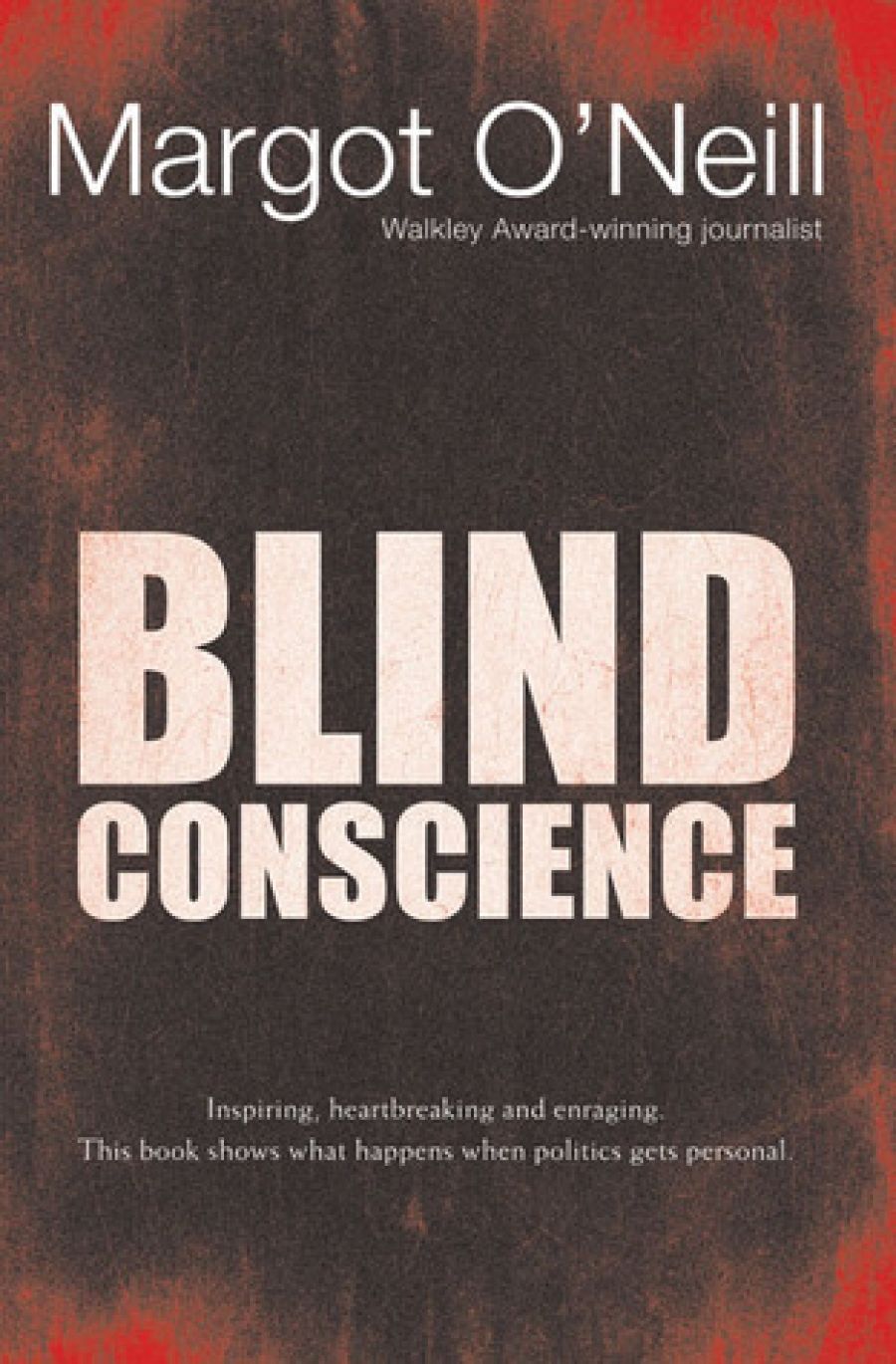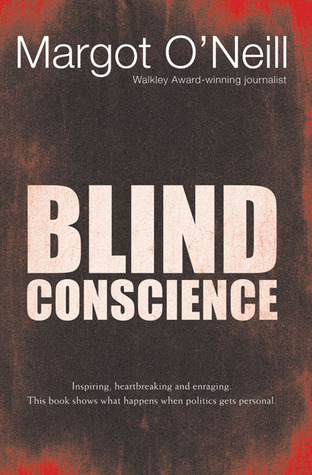
- Free Article: No
- Contents Category: Politics
- Review Article: Yes
- Article Title: Slow burn of realisation
- Online Only: No
- Custom Highlight Text:
Moral panics, which Stanley Cohen, in Folk Devils and Moral Panics (1972), said involve any group of people who are defined as a threat to societal values and interests, were grist to John Howard’s mill during refugee debates. Applying the classic analysis, his governments were ‘moral entrepreneurs’ who employed scare tactics whenever a perceived threat arose. Asylum seekers and their supporters were ‘folk devils’, outsiders and deviants responsible for the problems placing our values and principles in jeopardy.
- Book 1 Title: Blind Conscience
- Book 1 Biblio: NewSouth, $34.95 pb, 286 pp
- Book 1 Cover Small (400 x 600):

- Book 1 Cover (800 x 1200):

Seasoned professionals and neophytes populate the book, an assemblage of compassionate Australians emboldened by injustice but not usually given to overt protest. They come to know asylum seekers personally, witness suffering first hand and develop a terrible appreciation of mandatory detention’s deleterious consequences. O’Neill recounts their fraught struggles to mitigate the effects of pernicious immigration policies and to generate media scrutiny, confident that public exposure will force change.
Biographical snapshots and telling details highlight individual ethical concerns, revealing the experience, often a crystallising moment of awareness, which impels activism. This affecting testimony affords valuable insights, particularly given the Howard government’s efforts to marginalise advocates by impeaching their motives.
Books about these immigration controversies abound, notably David Marr and Marian Wilkinson’s seminal Dark Victory (2003) and Peter Mares’s thorough Borderline: Australia’s Treatment of Refugees and Asylum Seekers (2001). In this genre, investigative journalists (O’Neill is a veteran) are overrepresented, an antidotal response to the Fourth Estate’s failure to call a negligent government to account. Her angle, the behind-the-scenes activities of refuge advocates, is worthwhile.
O’Neill’s own path in writing the book is interesting. Initially suspicious of ‘dramatic claims by frantic activists’, her turning point is the painful story of a two-year-old Port Hedland detainee in sharp decline. Anger, shame, even fear grip her as the slow burn of realisation registers: this is ‘deliberate cruelty to powerless people’ in ‘fair go’ Australia. Using the advocates’ own words, O’Neill conveys their outrage when confronted with mounting evidence of lives fracturing and politicians detached from this grim reality. They rail against political inertia and public apathy, their exasperation palpable.
Incongruously, the first advocate O’Neill depicts is ‘the personification of the ageing revolutionary’, a veteran antiwar protester and communist who is partial to radical direct action. We are privy to the ‘Rebel Four’, Liberal Party backbenchers led by Petro Georgiou, who skilfully negotiate with Howard to reduce the harshness of mandatory detention.
Childcare worker Trish Highfield is spurred to act by children behind razor wire in Port Hedland. Julian Burnside, a barrister and lifelong Liberal, represents the family of an eleven-year-old detainee who attempts to hang herself. This haunts and motivates Burnside. His refugee advocacy expands, death threats ensue, colleagues and friends shun him, and his life changes irrevocably. Burnside and Highfield eventually invite refugees into their homes.
O’Neill paints sharp portraits of people compelled to protest by an overwhelming need to disassociate themselves from odious refugee policies. Surprising is their frequent shock at finding evidence which contradicts their belief in Australia as an egalitarian haven. Artist Kate Durham declares, ‘I will never recover the love I had for my country.’
Bearing witness transforms advocates. The ignominy and depredations of life in detention can edify. Anton Chekhov said, ‘People must never be humiliated – that is the main thing.’
Notwithstanding its unity of purpose, the refugee movement constitutes a broad church, and Blind Conscience becomes a study in contrasts. Strategics conflict, goals differ, personalities clash. There are fascinating accounts of inept attempts to assist detainees, including efforts to escape. Some advocates are naïve, counterproductive, and ultimately prejudicial.
Refugee narratives are often more compelling than those of their advocates. Aamer Sultan, the book’s most inspirational figure, whilst held in Villawood collaborates with research psychologist Zachary Steel to document the mental health problems of fellow detainees. Of detention he says, ‘We don’t know anything about our fate, but we are sharing the moment of trying to survive.’ Intelligent and selfless. Sultan seems indefatigable. It is sobering to learn that he later became clinically depressed. The book concludes with advocate updates. Reading Sultan’s is heart-rending: ‘Something seems to stand between me and happiness at this point in my life.’
The chapter entitled ‘Why, Mr Ruddock?’ is a highlight. O’Neill interviews the Amnesty International pin-wearing ‘Liberal Party hero’, who sits on the human rights subcommittee which impugned his policies. He acknowledges his duty to defend them, but eschews any obligation to be articulate. This is no Nixonian apologia. O’Neill’s pertinent questions range from detention centre conditions to Hansonism to personal responsibility. Ruddock’s masterclass in obfuscation displays his vast repertoire: rhetorical questions, combative sarcasm, semantics, unrepentant victim-blaming, forgetfulness.
Has Ruddock always answered questions this way? Satirists often take up the slack when the media falls asleep at the wheel. In The Howard Miracle (2003), John Clarke describes a mock interview with Ruddock as one ‘in which we get lost in a fog and have to radio for help.’ O’Neill’s excellent interview confirms this astute assessment.
Ruddock’s superciliousness bespeaks a politician beyond reflection, impervious to criticism or the force of expert medical opinion. Asked if mandatory detention harmed children, an established fact, he says ‘Well I don’t know. I know it’s asserted.’ To reprise Robert Manne’s question in In Denial (2001) about Aboriginal child removal: ‘Why has so much energy been expended in the attempt to deny ... that a really terrible injustice occurred?’
Ruddock regrets only his reference to a detained child as ‘it’, which was reminiscent of Howard’s repugnant shorthand ‘stock.’ O’Neill reveals in Ruddock a conscience iced by pragmatism and policy tunnel vision.
For context, O’Neill offers an essentially chronological, sometimes statistically dense and cursory account of the political events and climate in which the stories unfold. She uses journalistic, documentary voice-over language and the directness of testimony, garnished by the odd polemical flourish. Sympathetically narrating the facts, she occasionally emotes, a vexing intrusion. Her confidence in the stories’ own power wanes. This is most evident in the distracting tendency, albeit infrequent, to allude to the Holocaust, which also taints the Ruddock interview. I must confess that when Highfield asks a father how he protects his child in Port Hedland and he answers ‘I just talked to him, talked to him, talked to him. I take him to another place with my words.’ I considered the similarity to Robert Benigni’s character in his film Life is Beautiful (1997) before silently rebuking myself, for no legitimate point of comparison exists. It is an unhelpful and gratuitous inclination, best resisted.
O’Neill wishes to honour her subjects, and does. The book is tributary in another sense, for its contribution to the debate and unofficial historical record flows naturally into that larger sea of published works on immigration issues during the Howard years.
Mandatory detention required asylum seekers to languish in de facto asylums, ostensibly for our protection. John Berger wrote, ‘We only see what we look at. To look is an act of choice.’ Blind Conscience is about vigilance, rejection of a popular, politically engineered exercise in unknowing, and the perseverance of an alert minority. It reminds those who still need prompting that national shame is not ephemeral. In doing so, it resoundingly affirms the importance of mandatory attention over wilful moral impoverishment.


Comments powered by CComment